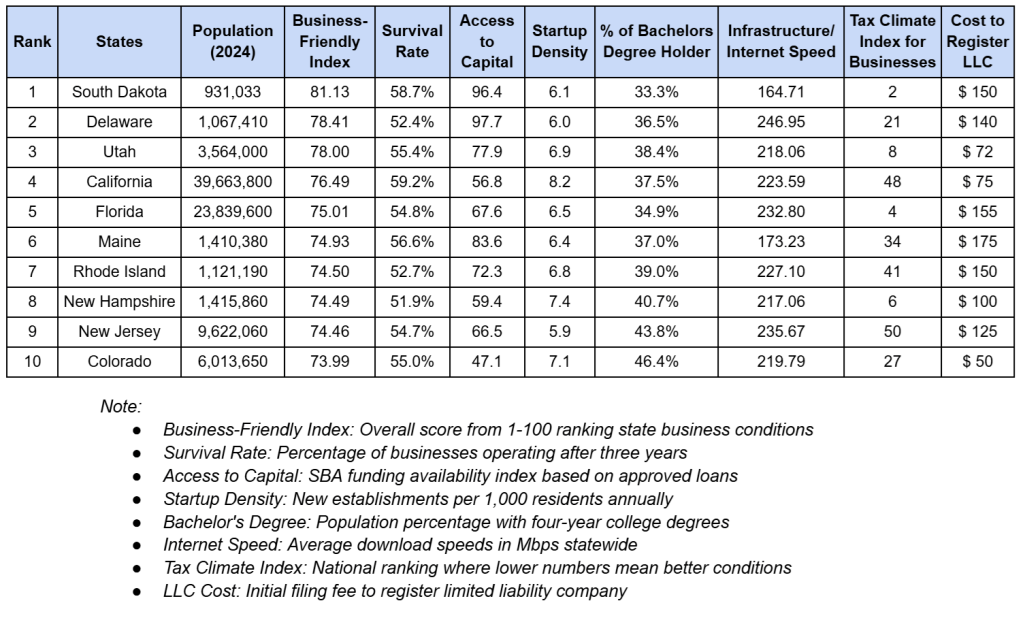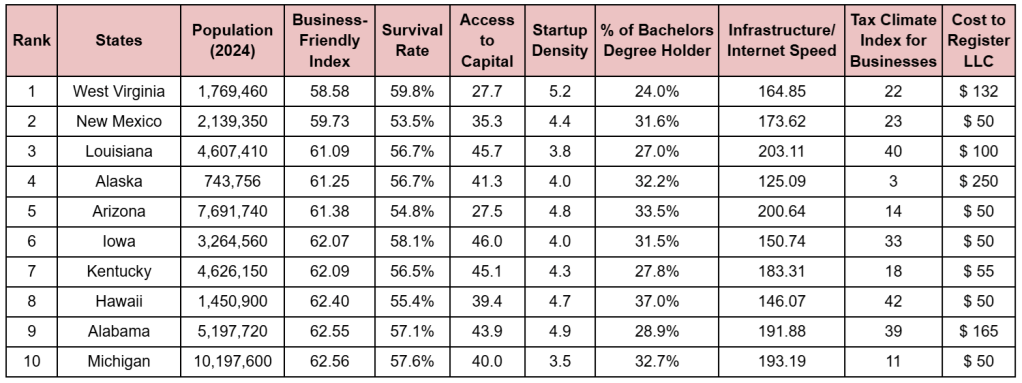Every year, millions of Americans dream of launching their own business. From tech startups in garage offices to family restaurants on Main Street, entrepreneurship represents the heart of the American economy. But location can make or break these ambitions, and choosing the right state could mean the difference between thriving and barely surviving.
Which states actually offer the best conditions for new businesses in 2025? Dancing Numbers, a data automation platform for Quickbooks, which is trusted by over 50,000 users, conducted a comprehensive study to answer this question.
“The data reveals significant disparities between states that can dramatically impact a business owner’s success,” says Punit K Jindal, founder of Dancing Numbers. “Smart entrepreneurs who factor location into their business planning can gain substantial advantages from day one.”
Dancing Numbers analyzed business conditions across all 50 states using seven weighted factors: business survival rates, access to capital, startup density, education levels, internet infrastructure, tax climate, and startup costs. Each factor was normalized relative to the best-performing state and weighted by importance to create a comprehensive business-friendly index scored from 1 to 100.
Table 1: Top 10 Best States to Start a Business

South Dakota claims top spot with winning formula
South Dakota dominates the rankings with an 81.13 business-friendly score, driven by exceptional access to capital (96.4) and the second-best tax climate in the nation. The state’s 58.7% business survival rate demonstrates that companies don’t just launch here, but actually last.
“South Dakota represents the gold standard for business-friendly conditions,” says Jindal. “With the second-best tax climate nationally and near-perfect access to capital, entrepreneurs here get the financial support and regulatory environment they need to succeed.”
Delaware secures second place with a 78.41 score, offering the highest access to capital nationwide at 97.7. The state’s business-friendly legal framework and 246.95 Mbps internet speeds provide a solid foundation for both traditional and digital ventures.
Utah rounds out the top three with 78.00, balancing strong education levels (38.4% bachelor’s degree holders) with favorable taxes (ranked 8th nationally). The state’s 6.9 startup density reflects a thriving entrepreneurial culture that supports new business formation.
“These top-performing states share common traits: excellent access to funding, educated workforces, and tax policies that don’t penalize business growth,” notes Jindal. “Entrepreneurs choosing locations from this list immediately improve their odds of long-term success.”
Table 2: Top 10 Worst States to Start a Business

West Virginia faces steepest challenges
At the bottom of the rankings, West Virginia scores 58.58, hampered by limited access to capital (27.7) and the lowest education levels among all states (24.0% bachelor’s degree holders). Despite having a respectable 59.8% survival rate, new businesses struggle to secure initial funding.
“West Virginia’s 27.7 access to capital score reveals the core challenge: entrepreneurs simply can’t get the funding they need to launch and grow,” explains Jindal. “When capital access is this limited, even great business ideas struggle to get off the ground.”
New Mexico follows closely at 59.73, with poor startup density (4.4) indicating fewer new businesses per capita. Louisiana claims third-worst with 61.09, suffering from the lowest startup density nationwide at just 3.8 new establishments per 1,000 residents.
“The bottom states create a multitude of challenges: limited funding, fewer educated workers, and environments that discourage new business formation,” warns Jindal. “Entrepreneurs in these markets are more likely to face an uphill battle from day one.”
Regional patterns emerge
The analysis reveals distinct regional trends. Western states like Utah, California, and Colorado consistently rank high, benefiting from tech-friendly cultures and educated workforces. Northeastern states including Delaware, Maine, Rhode Island, and New Hampshire also perform well, leveraging proximity to major markets and strong infrastructure.
Southern and rural states face greater challenges. Louisiana, Alabama, and Kentucky all rank in the bottom 10, typically struggling with lower education levels and limited startup ecosystems. The correlation between education and business success appears strong, as states with higher percentages of bachelor’s degree holders generally score better overall.
Internet infrastructure also seems to correlate with entrepreneurial success. States with faster average speeds tend to rank higher, reflecting the digital economy’s importance. Delaware leads with 246.95 Mbps, while Alaska lags at 125.09 Mbps, contributing to its lower ranking despite favorable tax conditions.
“We hope this data provides entrepreneurs with a roadmap for making one of their most important early decisions: where to establish their business,” Jindal says. “The 23-point gap between South Dakota and West Virginia points to dramatically different probabilities of success. Smart entrepreneurs should prioritize states with strong access to capital and educated workforces, as these factors directly impact both startup funding and talent acquisition.
“However, location isn’t destiny, and businesses can succeed anywhere with proper planning, but choosing the right state removes significant barriers and accelerates growth potential,” he adds. “The key is to match your business model to your chosen state’s strengths: tech companies benefit from high internet speeds and educated populations, while cost-sensitive operations might prioritize low registration fees and favorable tax climates.”
Methodology
This analysis examined business conditions across all 50 U.S. states using seven weighted factors to create a comprehensive business-friendly index scored from 1 to 100. Data was sourced as of Aug. 4, 2025, from multiple authoritative sources.
Business survival rates were calculated using U.S. Bureau of Labor Statistics data, measuring the percentage of businesses operating after three years, averaged across five consecutive cohorts from 2015-2020. Access to capital was measured using U.S. Small Business Administration data, creating an index based on SBA-backed funding availability, including both 7(a) and 504 loan programs, calculated per capita and per 100,000 residents.
Startup density data from the Bureau of Labor Statistics tracked private-sector establishments under one year old per 1,000 residents as of March 2024. Education levels were sourced from the American Community Survey (U.S. Census Bureau), measuring the percentage of population aged 25+ with bachelor’s degrees or higher. Internet infrastructure data came from HighSpeedInternet.com, measuring average download speeds in Mbps by state.
Tax climate rankings were sourced from the Tax Foundation, using their comprehensive index where rank 1 represents the best tax structure and rank 50 the worst. Business registration costs were compiled from Stripe.com, focusing on LLC filing fees as representative of small business startup costs.
Each factor was weighted based on its impact on business success: survival rates (25%), access to capital (20%), startup density (15%), education levels (15%), internet infrastructure (10%), tax climate (10%), and registration costs (5%). For each factor, the top-performing state received the maximum score of 100, with all other states scored relative to the leader. The average cost to start a business was log-transformed to prevent outlier effects before final scoring.
Illustration credit: Yurii Karvatskyi/iStock
Subscribe for free to get personalized daily content, newsletters, continuing education, podcasts, whitepapers and more…
Subscribe
Already registered? Log In
Need more information? Read the FAQs
